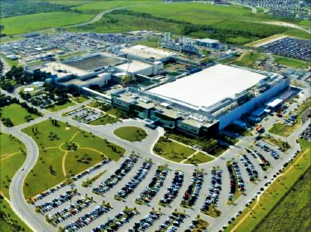Foundry business
Samsung wins Intel foundry order; TSMC takes GPU deal
By Jan 21, 2021 (Gmt+09:00)
3
Min read
Most Read

Intel has recently outsourced production of its southbridge chipsets, which are installed on the computer motherboard and control all of the computer's input and output functions, according to semiconductor industry sources on Jan. 21.
Earlier in the day, Samsung was understood to have taken a production order for graphics processing units (GPUs) from the US microprocessor manufacturer, but Taiwan Semiconductor Manufacturing Co. (TSMC) was entrusted with the GPU production. TSMC is planning to manufacture Intel GPUs using a 4-nanometer process.
Samsung will start producing IntelŌĆÖs southbridge chipsets at its foundry plant in Austin, Texas from the second half of this year, for a monthly output of 15,000 wafers. The production will be equivalent to 3% of the Austin fabŌĆÖs capacity.
ŌĆ£As a matter of fact, Samsung failed to win IntelŌĆÖs GPU order,ŌĆØ said one of the industry sources. ŌĆ£But this chipset foundry order is meaningful in that Samsung has built a foundation to win core chip orders in the future.ŌĆØ
Samsung declined to comment.
The Austin fab has the 14-nanometer technology process, outdated compared to the 5 nm to 7 nm processes used to produce application processors of state-of-the-art smartphones and central processing units (CPUs). But the 14 nm process covers a wide range of products, including 14 GPUs.
ŌĆ£Once Samsung Electronics expands its Austin fab, it will be able to produce high value-added products using the 5 nm ultra-micro fabrication process,ŌĆØ said Meritz Securities analyst Kim Sun-woo.
Samsung has been steadily adding to its giant lot of land in Austin, Texas where its US chip plant is located, raising expectations that the company may expand its foundry business. Intel, the US largest manufacturer of microprocessors, has already outsourced the production of some GPUs and other chips to TSMC.
Earlier this month, Bloomberg reported that TSMC was preparing to offer Intel chips manufactured using the 4 nm process. Another semiconductor industry source said TSMC is highly likely to use the further microtechnology of the 3 nm process to manufacturer CPUs from the end of next year.

By outsourcing the southbridge chipset production to Samsung, Intel may be able to focus on its flagship products, CPUs. For Samsung, the order placed by Intel may underscore its competitiveness in the foundry market where it ranks a distant second after TSMC.
Intel has been manufacturing its newest CPUs on the 10 nm fabrication process, while Samsung and TSMC produce chips using 5 nm and 7 nm processes as foundry companies.
Advanced Micro Devices Inc. (AMD), competing with Intel in the CPU market, is a key client of TSMCŌĆÖs chips produced in the 7 nm chipmaking process. Since last year, AMDŌĆÖs CPUs appeared to surpass IntelŌĆÖs in terms of quality, prompting market talk that Intel could outsource the manufacturing of GPUs, its non-core products, to foundry companies.
Earlier last year, Intel Chief Financial Officer George Davis said at a Morgan Stanley analyst conference that its 10 nm process would be less profitable than its previous nodes of 14 nm and 22 nm, and that its 10 nm process was behind in the competition.
Once Samsung expands its chip plant in Austin and operates ultra-micro processes below 5 nm, it could be chosen as a manufacturer of IntelŌĆÖs CPUs, industry sources said. Intel is planning to outsource some CPU manufacturing to foundry companies from the second half of 2023.
According to market tracker TrendForce, Samsung is expected to expand its share in the foundry market to 18% this year from 16.4% at the end of September 2020, with TSMC's share projected to remain steady at 54%. The global foundry market is estimated to grow by 6% year on year to $89.6 billion in 2021.
Last month, Samsung announced a deal to make next-generation GPUs for Nvidia Corp., a US chipmaker, using its 8 nm process technology.
(Correction: An earlier version of this story incorrectly reported that Samsung took the GPU manufacturing order from Intel.)
Write to Jeong-Soo Hwang at hjs@hankyung.com
Yeonhee Kim edited this article.
More to Read
-
 Earnings guidanceSamsung flags decent Q4 earnings growth, misses estimates on KRW, Apple
Earnings guidanceSamsung flags decent Q4 earnings growth, misses estimates on KRW, AppleJan 08, 2021 (Gmt+09:00)
3 Min read -
 Foundry boomSamsung, other foundry players at full capacity as chip orders surge
Foundry boomSamsung, other foundry players at full capacity as chip orders surgeJan 06, 2021 (Gmt+09:00)
4 Min read -
 SemiconductorsSamsung overtakes TSMC as top chipmaker by market cap
SemiconductorsSamsung overtakes TSMC as top chipmaker by market capDec 27, 2020 (Gmt+09:00)
4 Min read -
 Foundry dealsSamsung clinches 2nd deal to make NvidiaŌĆÖs latest gaming chips
Foundry dealsSamsung clinches 2nd deal to make NvidiaŌĆÖs latest gaming chipsDec 17, 2020 (Gmt+09:00)
3 Min read -
 Mobile application processorsSamsung to supply mobile chips to Xiaomi, Oppo; to rank 3rd in AP market
Mobile application processorsSamsung to supply mobile chips to Xiaomi, Oppo; to rank 3rd in AP marketNov 02, 2020 (Gmt+09:00)
3 Min read
Comment 0
LOG IN




